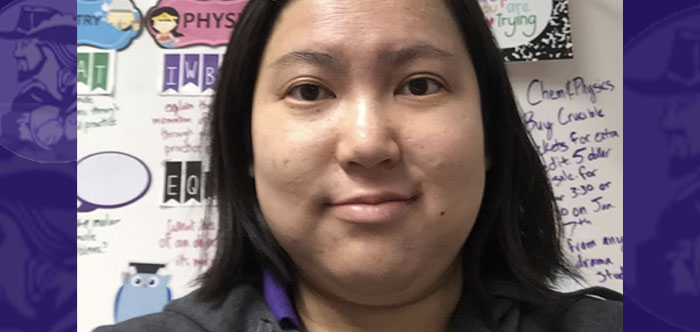
Santiago High School ranks among the top 25 schools in terms of the number of project applications submitted for this year’s OCSEF. For Teacher Appreciation Day we caught up with Vicky Lieu, Science Department Chair, Chemistry, Physics, and AP Physics 1 Teacher, and UCI MESA Advisor, whose name we often see on students’ applications, for a conversation about teaching and science projects.
“One of the things I like best about teaching is working with students and seeing how they grow mentally and physically after a year or more together,” Vicky tells us.
“I always love seeing the impact I can do to help them pursue their dream and help their family out of the poverty cycle if I can by motivating them to pursue a STEM career. In the past, my students would always ask, how can we apply science in real-life and OCSEF is the perfect answer to that. My former students would come back and be super jealous of all the extracurricular activities we now have for students.”
Santiago High School is one of the most prominent public high schools in Orange County. The school has seen a baseball player, a Jiu Jitsu superstar, and a TV star among its alumni. Lieu’s encouragement is evident in the growing number of OCSEF applications this year, which will potentially add a few successful scientists to the hall of fame.
“OCSEF provides students with the chance to solve questions they have always been wondering about or to apply either the scientific method or engineering method,” she says. “The advantage of submitting a project to OCSEF allows them to see and experience science in real life where they are the ones figuring out what the next steps will be. In other words, students are the investigator or designer behind their project versus following a set of directions from a teacher. This allows them to learn how to research, collect data, analyze data, form a conclusion, and lastly how to communicate all that information to an audience. I think all these aspects are super important in helping them not only to be stronger STEM science students but also overall stronger critical thinkers and future citizens.”
What were you like in high school? What drew you to learning STEM and eventually teaching STEM?
“I attended 2 different high schools where one had a student population of over 5000 students. I was a typical teenager that took several AP courses, became involved in several clubs on campus, and worked hard in academics. I loved STEM classes when I was a student, especially because I grew up in San Jose where I was always surrounded with all the big tech companies.”
“My chemistry teacher in high school really inspired me to love science and was one of the big reasons why I ended up majoring in chemistry. Regrettably, I never had the chance to tell him myself as it was his last year as my teacher before he retired. I am the type of person that likes hands-on and sitting still is something that is hard for me. STEM was just the perfect outlet for me to try different things and have fun.”
Knowing that a good project topic can lead to OCSEF success, Vicky says that the key to finding a subject is to think about what you enjoy doing outside of school.
“I ask my students if there is anything they have observed and always wondered about,” she says. “Did something happen in your family that affected or changed how you are today like an illness/accident? Is there something that you are passionate about or what would you like to change to make your community stronger? What are three things that come to your mind when asked how can you improve your community or school? Lastly, I usually have my students take a quick survey from Science Buddies as a starting point too. Or I have my students read the Science News articles in my classroom to see what are some of the current science research being conducted and have them think how they would apply this to their lives?”
